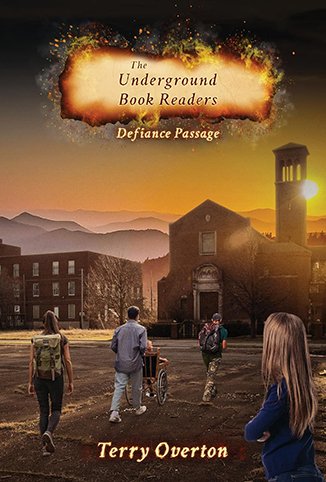A Retrospective on Education, Faith, and the Power of Storytelling
Terry Overton, retired professor, discusses her transition from academia to Christian fiction, blending teaching, faith, and award-winning storytelling
Embarking on a journey through the corridors of Terry Overton’s life and work reveals a profound dedication to education, psychology, and faith. With a repertoire spanning from the realms of academia to the realms of storytelling, Overton’s multifaceted career showcases a remarkable blend of expertise and creativity. A retired university professor boasting accolades in educational and school psychology, Overton’s contributions to the field have left an indelible mark. Yet, it is her foray into the world of Christian literature that truly illuminates her passion for teaching and storytelling.
From the very foundation of her career, teaching has been the cornerstone of Overton’s endeavours. Beginning in the trenches of public schools, she honed her focus on the individual learning needs of children, a principle that would remain steadfast throughout her professional journey. Transitioning to the realm of higher education, she expanded her scope to encompass the provision of educational strategies and psychological insights to aspiring educators and counsellors. As a dean and department chair, her mentorship extended beyond the classroom, nurturing the growth of faculty and administrators alike.
Now, in her role as a Christian author, Overton’s commitment to teaching finds new expression. Through a diverse array of literary endeavours, she endeavours to impart Scripture and Christian values to readers of all ages. Whether weaving tales of time travel in the Newton Chronicles or exploring themes of resilience in The Journey: The Underground Book Readers, Overton seamlessly integrates her faith into narratives that captivate and inspire.
In Legends of the Donut Shop, Overton draws from personal experiences and family stories to craft a narrative imbued with themes of second chances, forgiveness, and the transformative power of faith. Inspired by the camaraderie of her late father and his comrades, she breathes life into characters whose journeys mirror her own encounters with faith and redemption.
Balancing the rigors of academic writing with the artistry of storytelling is no small feat, yet Overton navigates this terrain with finesse. Drawing upon her background in educational psychology, she infuses her Christian fiction with a depth of understanding and a commitment to authenticity. Through meticulous research and consultation with theological experts, she ensures that her narratives resonate with readers on both intellectual and spiritual levels.
Overton’s literary endeavours have garnered acclaim, with awards such as the Firebird Book Awards and the International Book Award Finalist lending credence to her work. Yet, beyond the accolades lies a deeper mission—to share the good news and grow the church through the power of storytelling. With each book she pens, Overton seeks to ignite a spark of faith in the hearts of her readers, guiding them on a journey of discovery and transformation.
As she continues to chart new territories in the realm of Christian literature, Overton’s unwavering dedication to teaching and storytelling serves as a beacon of inspiration. Through her words, she invites readers to embark on a journey of faith, hope, and endless possibility—a journey that promises to leave an indelible mark on the soul.
Your background in educational and school psychology is extensive, with experience ranging from teaching to serving as a college dean. How has this background influenced your approach to writing Christian books and devotionals?
Teaching has been at the heart of all my professional positions and continues to be the centre of my writing. Teaching in public schools my focus was on individual learning needs of children. Teaching at the university level changed my focus to providing sound educational strategies, psychological, and behavioural techniques for teachers, counsellors, and school psychologists. As a university department chair and dean, my focus was mentoring faculty and young administrators. Now, as a Christian author, I strive to teach Scripture and Christian values. This might mean incorporating Bible history into a time travel series (Newton Chronicles), teaching the true meaning of Christmas using animated ornaments (The Oddball Ornaments), or teaching about Heaven and standing up for what is right (Legends of the Donut Shop).
Your book The Journey: The Underground Book Readers explores themes of resilience and perseverance in a dystopian world. What inspired you to write this series, and how do you integrate Christian values into the narrative?
Last year I interviewed school and community librarians about the current attempts to censor classic literature and Christian books in their own libraries and administrative structure. Their testimony inspired me to write a series that would place young readers in a world where books were banned, schools destroyed, and churches burned. The parents of the teen characters had been taken or “disappeared.” This left the teens and preteens in a world that would be of their own making. They were determined to continue to read, study, and even have their own church in an underground cavern. The children and teens in the series faced threats at every turn and had to rely on each other and the guidance from God through Scripture for survival.
Legends of the Donut Shop delves into themes of second chances, life lessons, and forgiveness. Can you discuss how your own experiences and beliefs inform the messages conveyed in this book?
This book was inspired by my late father and his buddies, all veterans of the Korean War, WWII, or Vietnam, who met each week at the local donut shop for fellowship and fun. Tales of my father-in-law, and my son-in-law, a rancher in Texas, are also incorporated in the story. The opening scene, a near-death experience, is based on my own near-death experience from thirty years ago. In the story, a teenage boy has a near-death experience and goes back in time to his childhood visits to the donut shop with his grandfather. He hears the same stories he heard before but this time, each story conveys a meaning he now understands. He at last embraces the meaning of Scripture and the Bible he had only superficially absorbed as a child. The same experience of renewed faith happened to me, and to many others who have had near-death experiences. Following this experience, I understood life after death, and I am secure in knowing where I will be following the transition from life to death and Heaven. My dad passed from Covid before he ever read the book. He had seen the cover and three weeks later, he contracted Covid. My mother passed the day before my dad. Dad’s buddies from the donut shop were the pallbearers at the funeral. I was blessed to give each on a copy of the book inspired by their group and my dad.
As a retired university professor, you’ve authored textbooks and journal articles in the fields of special education and school psychology. How do you balance the academic rigor of your professional writing with the storytelling elements of your Christian fiction?
Research was always something I loved about academia. In Christian writing, I conduct similar research on Biblical history, Jewish heritage, world geography, world history, the history of the United States, and historic documents. Authentic Christian fiction requires research. This must be carefully weighed with theological leanings and theological works. When possible, I consult with others who can provide more insight (Rabbis of Jewish faith and heritage, Messianic Jewish Rabbis, Christian pastors, etc.).
Your books have received several awards, including the Firebird Book Awards and the International Book Award Finalist. How do you feel these accolades have impacted your writing career and your mission to share the good news through your books?
It is hard to determine if the awards have much impact on my career, but I do feel receiving awards might bring credibility to my writing. Perhaps parents, teachers, or librarians might be more inclined to read a book that has had an award.
Assessing Learners with Special Needs: An Applied Approach is a practical guide for educators. How do you see your expertise in educational psychology intersecting with your passion for writing Christian fiction and devotionals?
My writing is geared to teaching as it was in the assessment textbook. In the future, I will be offering study guides for some of the Christian books for children.

EDITOR’S CHOICE
A thrilling, thought-provoking adventure celebrating resilience, faith, and the enduring power of knowledge in a dystopian world.
“Defiance Passage,” the sixth installment in Terry Overton’s “The Underground Book Readers” series, is a gripping tale that continues to captivate readers with its blend of adventure, suspense, and profound themes. Set in a dystopian future where books and Bibles are banned, and children live in a world devoid of parents, schools, and churches, this series offers a unique perspective on resilience and faith.



